Imagine a melody flowing from your fingertips, enjoying the driving pleasure with wide vision and sharp hearing and immersing in a 360-degree game. These are only samples of the more than 90 innovative projects that dazzled the audience during the University of Michigan-Shanghai Jiao Tong University Joint Institute’s (UM-SJTU JI) 2017 Summer Design Expo held on August 9. The design projects are from a number of summer experimental courses such as “Introduction to Engineering,”“Design and Manufacturing 3,”“System Design and Implementation” and “Undergraduate Research Project.” The semi-annual Design Expo is an all-round display of JI students’ innovative achievements.
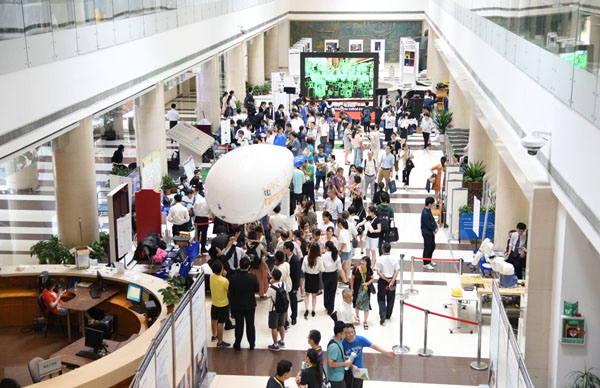
Corporate-sponsored Capstone Design Projects following the industry’s development trend
Artificial intelligence, virtual reality, driver-less vehicles … These hottest technology terms are the focus of attention. Projects sponsored by international leading companies such as Bosch, General Electric, Siemens, Intel, United Automotive Electronics, YITU Technology, Panasonic, Logic Solutions and Germany ZF closely follow the hottest industry trends, which awed the audience with the magic of science and technology.
The application of artificial intelligence in tourism
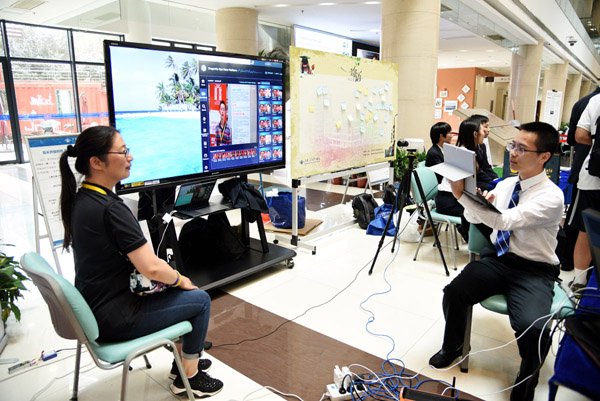
August is the peak of summer vacations overflowing with travel photos. In order to enhance the ease of recording a trip for the souvenir, the team of project “AI Application in Tourism” in collaboration with YITU Technology generates a map where users store photos on the locations along their travel routes. In addition, the team also uses face recognition and comparison technology to tag travelers and send them photos.
VR 360 stabilization by OpenCL
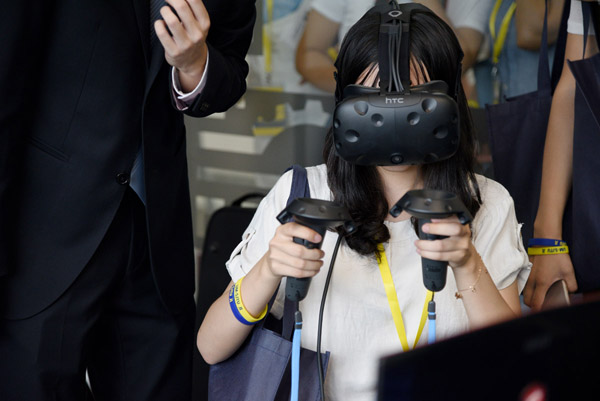
With the advent of the first virtual reality (VR) device, to immerse in virtual reality is no longer an exotic experience. However, while the headset is displaying a 360 ° panorama, any jitter of the camera will be magnified and cause dizziness for the user. The project “VR 360 stabilization by OpenCL” sponsored by Intel found the jitter is mainly due to non-smooth movements. To solve the problem, the team made use of the gyroscope in the 360-degree camera to track the jitter and adjusted the relative motion between successive frames to provide a more comfortable viewing and user experience.
Self-parking Automobile System
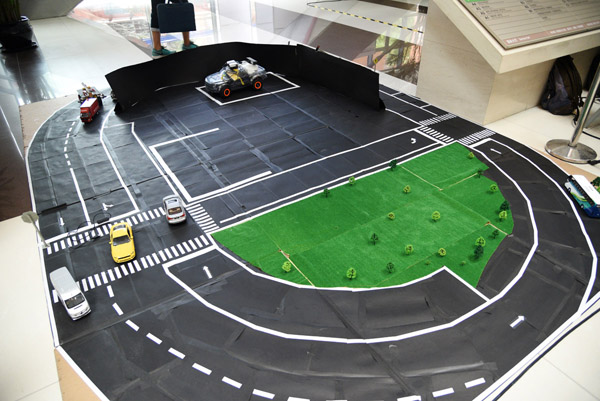
While people are excited about self-driving cars, self-parking technique is often ignored and should be addressed before deploying the driverless cars on the roads. Supervised by Professor Chengbin Ma, the team of “Self-parking Automobile System” built a self-parking system that can imitate a vehicle in an enclosed simulation system. A chassis made of strong engineering-grade plastic can be remotely controlled to move, turn, react and brake in an emergency. The parking system can also detect parking lines or obstacles and enable the car to park at a lower speed.
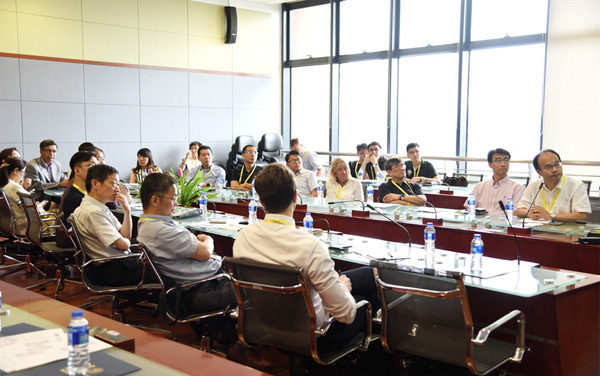 Strong Corporate Presence at the Design Expo
Strong Corporate Presence at the Design Expo
Since the first corporate-sponsorship was launched at JI in 2010, more and more multinational companies have sponsored “custom” projects that follow their market trends. JI has provided students with opportunities to collaborate with company engineers to improve their ability to solve practical problems. Within three months, students learned to solve design problems, apply interdisciplinary engineering knowledge to innovative practice and experience the real workplace atmosphere in advance.
In recent years, the proportion of JI’s corporate-sponsored projects has increased every year and JI students have earned accolades from the sponsors. The companies would like further collaboration with JI in capstone design, scientific research, scholarships, internship, employment and career development guidance. Through the courses, exchanges and other effective means, JI stimulates students’ creative thinking and provides a multichannel and comprehensive platform for talent training and business cooperation.
Freshmen’s innovative projects promote smart living
Have you imagined a counting piggy bank, an automatic liner-changing trash bin or a shopping cart that follows you? JI freshmen have tried to turn these fantasies into reality through their class projects of “Introduction to Engineering,” the brand name course of JI, which focuses on students’ ability to solve practical problems while stimulating their interest in engineering.
Motion Tuner
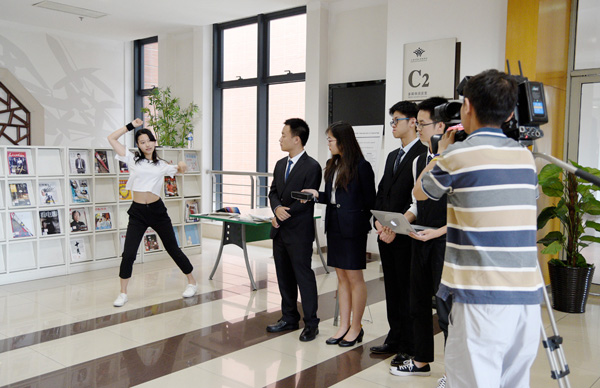
Making music is no longer limited to creative musicians. Thanks to project “Motion Turner,” anyone can produce music by moving body and limbs. Users only need to hold a cell phone or wear a bracelet and start dancing. The phone or bracelet will automatically generate the corresponding tune and rhythm. The user can also select the type of music to maximize the joy of playing music.
Gesture Control Game System
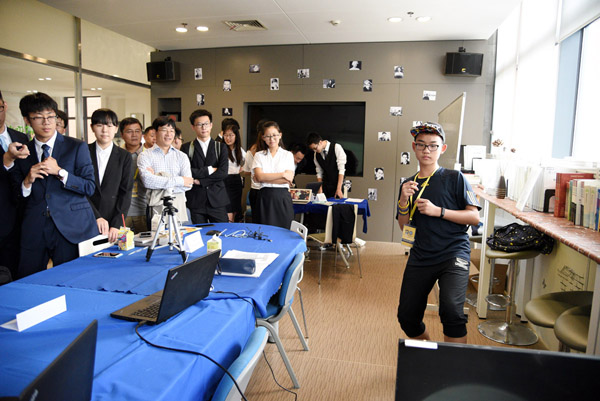
Immersion somatosensory games are popular among many game enthusiasts, but the prevailing products have their own limitations. In response to this problem, the somatosensory game system based on posture recognition developed by the team of the “Gesture Control Game System” applies to any existing game camera on the market, greatly reducing the cost of somatosensory games. The game is an open source system: a user can participate in the game development by matching a gesture with one in the system and publishing the results on the team’s website so that more gamers can contribute to the development of the system.
Iglove – Wearable Keyboard
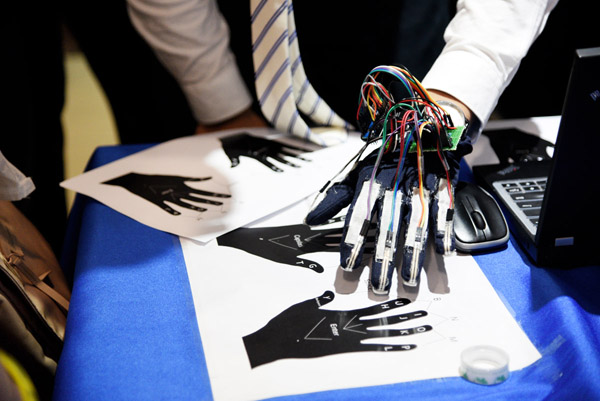
The computer keyboard, as the computer’s main input method, has more than 150 years of history without much changes. The team of project “Iglove – wearable keyboard” tried to develop a general keyboard without loud noises, inconvenience and other issues of the glove keyboard. The gloves are equipped with a pressure sensor and a curved sensor on each finger. The operator can easily type on any surface. This not only solves the problems of typing noise and portability, but also makes typing easier and more efficient.
As JI’s brand course, “Introduction to Engineering” allows students to participate in interesting projects. Students are encouraged to find problems in daily life and use the basic engineering knowledge to solve the problems with innovative thinking. In addition, the course teaches technical writing in English, a writing skill necessary for engineers
Nurturing future engineers from undergraduate classrooms to research labs
The visitors were also impressed by the brilliant creative projects by the students of the new course “undergraduate research projects.”
Link analysis of Terahertz Satellite Communication based on large – scale antenna array
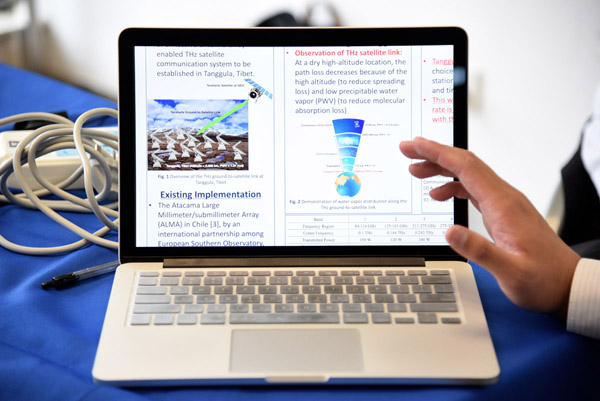
Satellite communication has broad application prospects, playing an important role in satellite TV, global communications, disaster prediction and so on. With the increasing demand for communication speed, the terahertz band with a wide band and good astronomy and physical properties has become a new platform for the development of satellite communication technology. The United States, Europe, Japan and other developed countries have begun terahertz satellite communication research and implementation, but there is still no mature solution in China.
In the project of “link analysis of terahertz satellite communications based on a large-scale antenna array,” the team members proposed a complete set of terahertz satellite communication based on a large-scale antenna array. They suggest the ground base station to be built at a high altitude, low humidity area of the Tanggula Mountains in Tibet to reduce path losses while achieving large power gains through large-scale antenna arrays. Using the method of link analysis, the team members examined the characteristics of the terahertz channel, analyzed the possible impact of environmental factors such as altitude, water vapor, cloud, precipitation and so on and designed a large-scale antenna array at the ground terminal. The link analysis results show that the base station located in the Tanggula area is expected to reach more than 1 terabyte per second (Tbps) of the transmission rate.
Over the years, JI has been committing to improve the level of academic innovation and teaching innovation to build a world-class teaching and research institute in China to cultivate innovative global leaders. Through SJTU resources, JI courses, innovation clubs and related competition opportunities, JI has built a broad platform of technological innovation for undergraduate students. JI’s experimental courses not only stimulate students’ interest in science and technology, but also cultivate students’ abilities in scientific exchange and innovative thinking.
Since 2015, JI has offered an undergraduate research course based on faculty’s research projects, which opens to junior and senior students. JI encourages students to actively participate in SJTU’s PRP (Participation in Research Projects) and IPP “Innovative Participation Program.”
Due to their creativity and excellent presentation, 50% of JI undergraduate students’ IPP projects have been promoted to the Shanghai municipal level and national level.
2017 JI Summer Design Expo award list
Vg100: Introduction to Engineering
- Best Innovation Award:
- Gesture Control Game System
- Motion Tuner
- Chlorophyll Detector
- Best Technology Award:
- The Real-time determination of the number of passengers
- iGlove—Wearable keyboard
- Automated Handwriting Machine
VM450 & VE450 Capstone Design Projects
- Silver Award:
- A demonstration model for mini EV platooning based on 4-point ranging approach
- An interactive robotic system for playing Chinese chess game
- Gold Award: AI Application in Tourism
